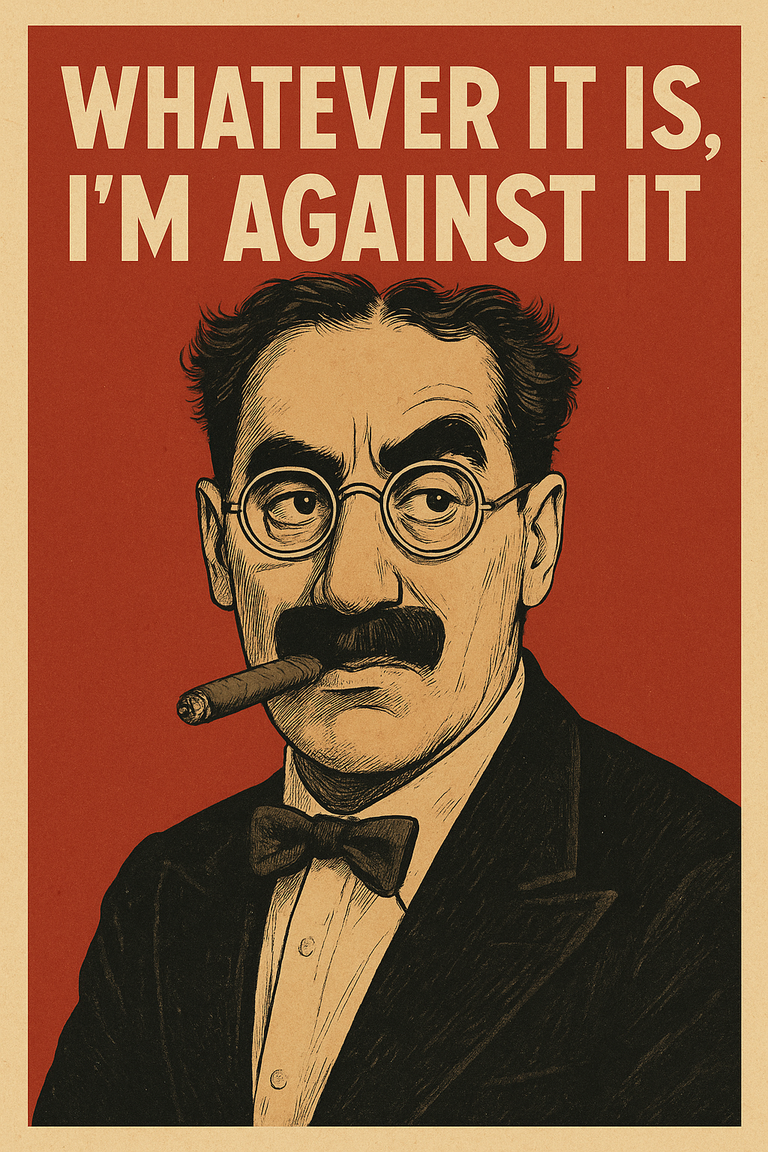If you have ever interacted with me on Discord, you have seen that right under my name I have the text "Whatever It Is, I'm Against It". A handful of people have commented on that over the past year, the latest being @ecoinstant. Though I'd love to take credit for the line, it's actually an old Groucho line.

Oh Groucho... what can we say about him. I'd imagine most people aren't directly familiar with him these days. But I'd also wager almost all of you have been indirectly exposed to him. If you ever watched a Bugs Bunny cartoon — well, Bugs Bunny's entire personality was a thinly-veiled Groucho. To audiences of the time when the Loony Tunes cartoons came out, this was pretty obvious. In the years since, most people probably aren't aware of it.
If you’re a fan of fast-talking wisecracks, anti-authoritarian glee, and slapstick anarchy, then chances are you would love Groucho Marx—even if you wouldn't be entirely sure what he was railing against.
The line that best captures Groucho’s spirit comes from Horse Feathers, released in 1932. In one of the film’s early scenes, Groucho — playing the newly appointed president of a college — stands up at an academic ceremony and breaks into song:
I don’t know what they have to say,
It makes no difference anyway,
Whatever it is, I’m against it!
He sings it with that unmistakable lurch of irritation and mockery, turning the simple refrain into a comedic manifesto. (Watch here).
The entire cast of the Marx Brothers is really a delight to watch. In addition to fast-talking Groucho, we have the piano-playing Chico who speaks with an Italian-Brooklyn accent and is constantly scheming, Harpo who is always silent, always smiling, and plays a wonderful harp. The three main brothers are often joined by Zeppo, who always played the straight man, despite (in Groucho's words) being the funniest of all of them.
The Marx Brothers dominated Vaudeville and later early talkie movies in the 1920s and 1930s.They were rediscovered by audiences in the 1970s and had a brief cultural comeback, before then faded from view again. I discovered them randomly in the early 1990s, by finding one of their old movies at Blockbuster one night and being curious enough to give it a try.[1] I very quickly became a fan.
As good as the entire group was, Groucho was the standout and most popular member. Groucho’s onscreen persona — marked by a greasepaint mustache, stooped walk, and arched eyebrows — was the embodiment of controlled chaos. He was the guy in the room who punctured pomposity, skewered the elite, and made sure no one took themselves too seriously. But he didn’t do it with brute force. He used wit like a scalpel, slicing up the establishment with sarcasm and speed.
Groucho’s curmudgeonly stance wasn’t purely crankiness, however. It was protest. He employed satire artfully and with the precision of an engineer. Whether he was mocking politicians (Duck Soup), academia (Horse Feathers), or the rich and idle (Animal Crackers), he always stood for the little guy — if only by showing how absurd those in power really were.
Even when he was “against it,” he wasn’t passive. He was relentlessly active — cutting off pompous windbags, refusing to play along, and breaking the fourth wall to let us in on the joke. His lines were sharp, but his targets were always deserving.
Behind the wisecracks, there was a kind of logic to Groucho’s madness. “Whatever it is, I’m against it” isn’t just a throwaway gag: it’s a deeply Groucho line. Not because he didn’t care, but because he cared too much to sit silently while the world turned stupid around him.
If anything, his brand of comedy feels just as relevant today as it did in his day. Interestingly enough, the US is in a very similar position to where it was back then. The Marx Brothers came up in the Gilded Era, when the rich held incredible power and the working class was brutally repressed — conditions that are not too far removed from today, when the rich have once again gained enough power that we could almost be considered to be back in the Gilded Age.
I challenge you: go find and watch Duck Soup. How would he react to Trump and the chaotically ridiculous world we find ourselves in today? Duck Soup shows you exactly how he'd respond.
Do we have a Groucho today? No. He was one-of-a-kind. Jon Stewart sometimes fits the bill, when he shows a razor wit fueled by a deep intelligence and an outrage at injustice, but then he constantly undercuts himself, putting himself down after every single joke. Groucho was the opposite of self-effacing; he projected complete confidence and when people attacked him for his politics or called him out for being full of it, he doubled-down.
Ricky Gervais might be a bit closer. Gervais doesn't wade into politics as much as Groucho did, but he does go after the rich and powerful, mocking status and hypocrisy with a Groucho-like glee.
But I digress.
What's your favorite Groucho movie? And, again, if you haven't seen any: go watch Duck Soup.
It was A Night at the Opera for any curious. ↩

